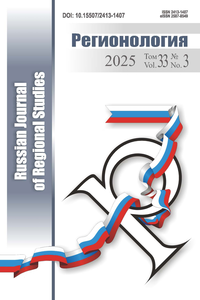V. M. Sidorkina, I. M. Fadeeva. Family Values in a Regional Society: Factors of Change
V. M. Sidorkina, I. M. Fadeeva. Family Values in a Regional Society: Factors of Change
Key words: transformation of family values; regional society; globalization; virtualization; students of secular and theological educational institutions; university students; young scientists; convergence of values; delayed marriage, later motherhood and childbirth
Introduction: the objective of the article is to identify the most significant trends of the transformation of family values in regional societies, the influence of institutional factors (Internet, religion, education, career), as well as the processes of globalization. The relevance of the topic is in the statement of the problem of convergence of values (including the family ones) under the influence of processes of social change (globalization, formation of network society) and finding common features of social institutions, regardless of the site of localization. Despite the fact that in the opinion polls the family is ranked quite high, there is a shift in this value towards delayed marriage, late childbearing, which is the case in developed countries and in the Russian society. This is a consequence of the improving level of education, women’s focusing on careers which has become characteristic of the youth.
Materials and Methods: the paper is based on the results of sociological research in which the authors of the article took part: 1) survey “Values of virtual community” in 2015 (n = 216); 2) survey “Values of the students of the Mordovia State University, Saransk Theological Orthodox School and Penza Theological Seminary” in 2017 (n = 491); 3) survey “Attitudes towards Late Childbearing” in 2017 (n = 112) conducted in the Republic of Mordovia. The method used is questionnaire survey.
Results: the results of surveys examining the family values in a regional society were presented; the authors identified the problem areas of convergence of the family values under the influence of institutional factors (Internet, religion, education, career), formation of network society and globalization in the space of the Russian regions. The internal change in family values in the conditions of transformation of Russian society was revealed; the manifestation of the convergence of family values of Russians with Western values and their consequences were identified. The factors and directions of transformation of the family values under their influence were identified, and the internal contradictions that need to be considered when solving problems of family policy were revealed.
Discussion and Conclusions: the family values are considered as group representations of a society (in this case, the regional one) relative to the institutions of family and marriage, childbirth, fatherhood, motherhood, relationship of society to their respective roles. In the last two decades, influenced by a number of factors of social change (Internet, education, career, religion), the family as an institution undergoes transformation. Despite the high ranking of the family values in the minds of the population (1—2 positions among middle-age generations, 3—4 positions among young people), such phenomena as delayed marriages, later motherhood and childbearing are observed. The catalysts of these trends are globalization, formation of network society and the influence of media, duplicating the models of the new behavior, including those without a families and children.
REFERENCES
1. Belyaev I.A. [Value Content of Unique World Realationship]. Vestnik Orenburgskogo gosudarstvennogo universiteta = Vestnik of the Orenburg State University. 2004; 2:9—13. Available at: http://vestnik.osu.ru/2004_2/1.pdf (accessed 14.05.2017). (In Russ.)
2. Rudkevich E.Yu. [System of Values in a Society: Structural Analysis]. Vlast’ = The Power. 2007; 1:92—95. Available at: https://cyberleninka.ru/article/n/sistema-tsennostey-obschestva-struktur... (accessed 14.05.2017). (In Russ.)
3. Leontiev D.A. [Value Orientations in Individual and Group Consciousness: Types, Determinants and Change Over Time]. Psyhologicheskoye obozreniye = Psychological Review. 1998; 1:13—25. Available at: http://www.follow.ru/article/344/ (accessed 23.05.2017). (In Russ.)
4. Rassadina T.A. [Russians Values in Sonditions of the Risk Society]. Izvestija Saratovskogo universiteta. Novaja serija. Serija: Sociologija. Politologija = Izvestia of Saratov University. New Series. Series: Sociology. Politology. 2013; 1:47—53. Available at: https://cyberleninka.ru/article/n/tsennosti-rossiyan-v-usloviyah-obsches... (accessed 24.05.2017). (In Russ.)
5. Asrieva S.V. [Social and Cultural Nature of the Family and Parenthood]. Vestnik Moskovskogo gosudarstvennogo universiteta kul’tury i iskusstv = Bulletin of the Moscow State University of Culture and Arts. 2016; 1:143—147. Available at: https://cyberleninka.ru/article/n/sotsiokulturnaya-priroda-semi-i-rodite... (accessed 04.06.2017). (In Russ.)
6. Bezrukova O.N. [Values of Parenthood: Structure, Types, Resources]. So-tsiologicheskie issledovaniya = Sociological Studies. 2016; 3:118—127. Available at: http://socis.isras.ru/article.html?id=6107 (accessed 04.06.2017). (In Russ.)
7. Dadaeva T.M. [Conflicts in Young City Families]. REGIONOLOGIYA = REGIONOLOGY. 2015; 4:148—157. Available at: http://regionsar.ru/ru/node/1432 (accessed 04.06.2017). (In Russ.)
8. Balbo N., Billari F.C., Mills M. Fertility in Advanced Societies: A Review of Research. European Journal of Population. 2013; 1(29):1—38. DOI: https://doi.org/10.1007/s10680-012-9277-y
9. Rindfuss R.R., Bumpass L., St John C. Education and Fertility: Implications for the Roles Women Occupy. American Sociological Review. 1980; 3(45):431—447.
10. Bernardi L., Klärner A. Social Networks and Fertility. Demographic Research. 2014; 1(30):641—670. DOI: https://doi.org/10.4054/demres.2014.30.22
11. Bauer G., Jacob M. Fertility Decisions and Partnership Context-Effects of Educational Constellations on Family Formation Based on German Mikrozensus Data from 1996—2004. Kolner Zeitschrift fur Soziologie und Sozialpsychologie. 2010; 1(62):31—60. DOI: https://doi.org/0.1007/s11577-010-0089-y
Contribution of the authors:
Valentina M. Sidorkina — initiation of the research, determination of the theoretical and methodological foundations of the research, writing of the article.
Irina M. Fadeeva — search for analytical materials in Russian and foreign sources, drawing conclusions, writing and revision of the article.
About the authors:
Valentina M. Sidorkina, Candidate of Philosophical Sciences, Associate Professor at the Department of Sociology, National Research Mordovia State University (68 Bolshevistskaya St., Saransk, 430005, Russia) (е-mail: sidorkinavm@yandex.ru). ORCID: http://orcid.org/0000-0002-1575-9146
Irina M. Fadeeva, Doctor of Sociological Sciences, Professor at the Department of Sociology, National Research Mordovia State University (68 Bolshevistskaya St., Saransk, 430005, Russia) (е-mail: fadeeva5@yandex.ru). ORCID: http://orcid.org/0000-0002-4501-5770
For citation: Sidorkina V.M., Fadeeva I.M. Family Values in a Regional Society: Factors of Change. REGIONOLOGIYA = REGIONOLOGY. 2017; 4(25):628—641.

All the materials of the "REGIONOLOGY" journal are available under Creative Commons «Attribution» 4.0
















